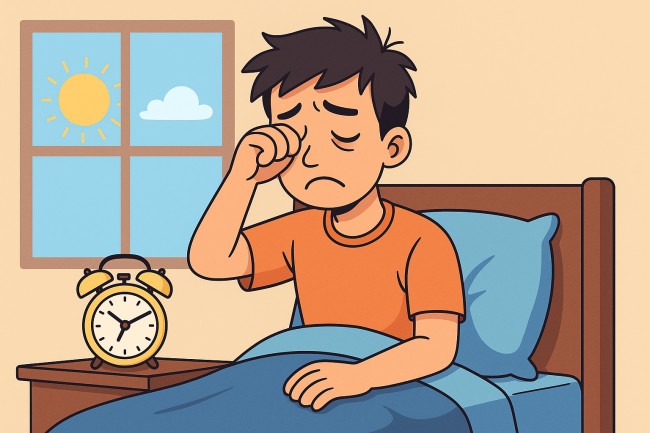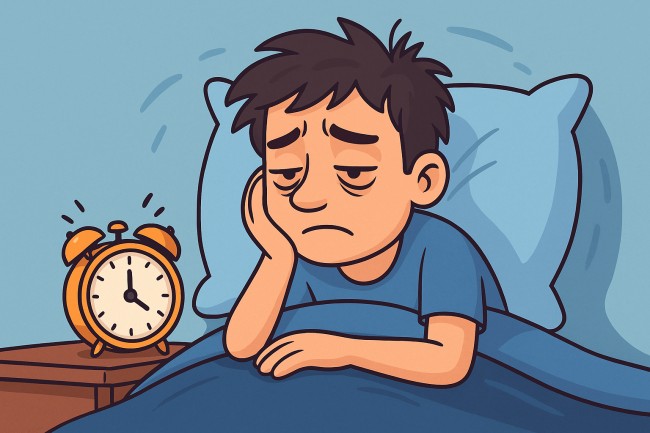You crawl into bed, lights off, no buzzing phone, no caffeine within sight. You sleep eight long hours, maybe more. And yet – morning comes, alarm clock blaring, and you feel like you’ve been steamrolled.
The mind is foggy, limbs heavy, motivation hiding in the corner. Sound familiar? You’re not alone. Plenty of people tick the recommended “8-hour sleep” box and still wake up more worn out than they were before hitting the pillow.
So why does this happen? The story isn’t just about time – it’s about the quality of sleep, the way your body cycles, your environment, lifestyle habits, even invisible health glitches. Let’s peel the layers back.
1. Sleep Quality Isn’t Equal to Sleep Quantity
You’ve heard the cliché: “Get eight hours, you’ll be fine.” Wrong. The human body isn’t a vending machine where you insert time and receive energy. Sleep is built on layers – light, deep, and the dreamy REM stages. Miss the deep or REM phases, and you’ve basically skimmed through the night without downloading the real updates your brain and body needed.
Ever wake up at 6 AM and feel like you’ve been jolted out of a dream? That’s the problem. Sleep cycles run about 90 minutes each. If you’re yanked out mid-cycle, your system protests. It’s like slamming the brakes while cruising at highway speed. The result: grogginess that clings like wet clothes.
2. Stress: The Silent Saboteur
Corporate workers know this beast too well. Stress doesn’t clock out when you do. It sneaks into bed, weaving cortisol and adrenaline into your bloodstream like unwanted bedfellows. Elevated stress hormones make it harder for the nervous system to wind down, keeping your brain hyper-alert. You may technically be asleep, but the brain is still doing jumping jacks.
High stress also triggers micro-awakenings—tiny moments where you stir without realizing it. Add them up, and your “8 hours” is more like a choppy mess of interruptions. No wonder mornings feel brutal.
3. Poor Sleep Hygiene and Night Rituals
Let’s talk environment. Your bed is not just a slab of foam; it’s the stage where recovery plays out. Yet too many people sabotage themselves with glaring bedside lamps, doomscrolling, midnight snacks, or sleeping in overheated rooms.
Blue light from screens messes with melatonin – the hormone that signals your body to sleep. Late-night alcohol may knock you out quickly, but it slices REM cycles to ribbons. Heavy meals force your digestive system to stay up when the rest of you wants to check out. Even bedroom clutter can keep your subconscious on guard.
Simple shifts – cooler rooms, dark curtains, gadget curfew – often fix more fatigue than another cup of espresso ever could.
4. Sleep Disorders: The Invisible Culprits
Sometimes the cause hides deeper. Sleep disorders often go undiagnosed for years. Sleep apnea, for instance, interrupts breathing repeatedly through the night. Each pause jolts you out of deep sleep, leaving you starved for oxygen and energy. Loud snoring is the billboard sign, but many people with apnea don’t even realize they’re gasping all night.
Other culprits: restless leg syndrome, where twitching limbs jolt you awake, or insomnia, which stretches the night into a restless eternity. Even narcolepsy, though rare, can play a role. These aren’t just quirks; they’re health conditions that rob sleep quality.
5. Circadian Rhythm Mismatch
Your body isn’t a machine – it’s tuned to an internal clock called the circadian rhythm. This rhythm loves consistency: waking, sleeping, eating, even hormone release all march to its beat.
When you ignore it – say, by pulling late work nights, scrolling TikTok until 2 AM, or shifting schedules on weekends – you throw it into chaos. You might sleep 8 hours but at the wrong window for your body. The result? You wake up groggy, like jet lag without the plane ticket.
6. Diet and Hydration Blunders
Nutrition doesn’t stop working when you sleep. Eat greasy takeout at 10 PM and your digestive system stays up crunching numbers long after you lie down. Too much sugar spikes blood glucose, leading to restless tossing. Too little water, and dehydration creeps in, causing morning headaches and lethargy.
On the flip side, stimulants like caffeine sneak around longer than you expect. That innocent 4 PM latte? Still in your bloodstream at midnight, whispering “stay awake” to your neurons.
The fix isn’t complicated: balanced meals, earlier dinners, and enough water before bed – but not so much that you’re up for bathroom trips all night.
7. Hidden Medical Conditions
If you wake up tired despite near-perfect sleep hygiene, there could be something medical lurking beneath. Thyroid disorders slow metabolism, draining energy no matter how long you rest.
Anemia leaves your cells starved for oxygen, making mornings feel like climbing Everest. Chronic fatigue syndrome, fibromyalgia, or even subtle vitamin deficiencies can mimic poor sleep without any obvious clues.
This is where self-help tips end and professional care begins. Regular check-ups, blood tests, and conversations with your doctor matter more than any blog advice if fatigue sticks around relentlessly.
8. Mental Health Interference

Anxiety, depression, burnout – they all have one thing in common: they wreck sleep quality. Anxiety speeds the brain up, replaying worst-case scenarios while you try to drift off.
Depression often disrupts REM patterns, leaving mornings hollow and heavy. Even mild cases of “Sunday night dread” can shorten deep sleep phases.
It’s not weakness; it’s biology. Neurotransmitters like serotonin and dopamine play a role in both mood and sleep regulation. When they’re off balance, sleep doesn’t work like it should. Therapy, mindfulness practices, or medical treatment can reset the chemistry and improve both mood and rest.
9. Technology Overload
We live in a buzzing hive of devices. Notifications, midnight emails, endless scrolling. The body wasn’t designed for constant digital exposure, especially not before sleep.
Blue light tricks your brain into thinking it’s still daylight, delaying melatonin release. Social media overstimulates emotions – anger, envy, excitement – all of which keep the nervous system on edge.
Even after you switch the phone off, the residual stimulation lingers. The mind replays posts, conversations, work stress. By the time you fall asleep, the body has already lost precious recovery hours.
10. Poor Morning Habits Compound the Problem
Strangely enough, how you wake up matters as much as how you fall asleep. Smash the snooze button repeatedly, and you’re fragmenting your final sleep cycle into useless scraps.
Check emails in bed, and you’re throwing stress into your bloodstream before you’ve even stood up. Skip natural light exposure, and your circadian rhythm misses the signal to reset.
Instead, mornings should feel like a gentle ramp-up – open curtains, drink water, stretch, maybe a walk outside. That simple dose of sunlight tells your body: “It’s morning, reset the clock.”
11. Overtraining or Physical Exhaustion
Not all fatigue comes from under-activity. Corporate professionals squeezing in late-night workouts sometimes overshoot. Overtraining leaves cortisol levels high, muscles sore, and recovery incomplete. The body stays in “repair mode” even while you’re asleep, interrupting deep recovery phases.
Balance is key. Movement helps sleep; punishment routines wreck it. Listen to your body – rest days are not laziness, they’re strategy.
12. Aging and Changing Sleep Architecture
As we age, sleep architecture changes. Deep sleep windows shrink, leaving more light sleep phases. Older adults often wake multiple times per night without realizing it. Hormonal changes also shift the balance, making it harder to feel refreshed even after seemingly sufficient hours.
Accepting this reality and adjusting routines – earlier bedtimes, gentler evenings, health checkups – can soften the blow. Sleep may change, but with awareness, rest can still be restorative.
Practical Fixes to Finally Wake Up Refreshed
- Prioritize sleep quality over hours. Aim for consistent bed and wake times.
- Audit your environment. Dark, cool, quiet bedrooms make a difference.
- Respect circadian rhythms. Stop bingeing Netflix until 3 AM.
- Cut stimulants early. Move caffeine before lunch.
- Deal with stress proactively. Journaling, mindfulness, workouts – choose your weapon.
- Check for disorders. If fatigue persists, consult a professional.
- Morning rituals matter. Sunlight, hydration, movement beat snooze-button abuse.
Final Thoughts
Waking up tired after 8 hours of sleep is not just an annoyance – it’s a signal. Something in the system, whether environmental, emotional, or medical, isn’t lining up. Treat it as feedback, not failure.
Sleep is the body’s repair shop. If you walk out still dented, don’t blame the clock. Blame the disruptions, the uninvited intruders, the choices made before bed. Eight hours is only the shell; the quality packed inside is what matters.
Next time you wake up tired, don’t just sigh and pour another cup of coffee. Step back. Investigate. Small changes stack into real transformation. And who knows? Mornings might one day feel less like a battle and more like the beginning of something powerful.
Also Read:

